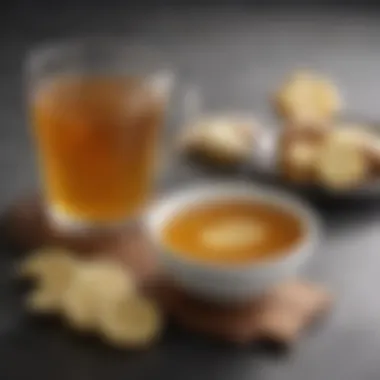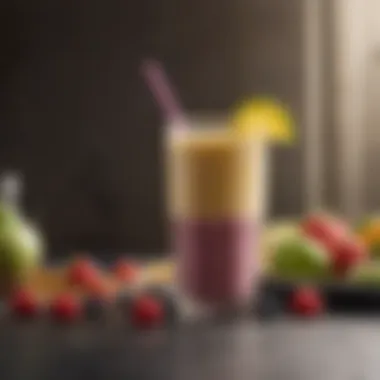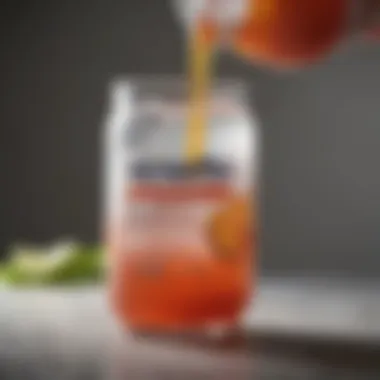Effective Drinks for Hangover Relief: A Guide


Intro
Experiencing a hangover can be an uncomfortable ordeal. The aftermath of a night filled with cocktails and socializing often leaves one grappling with headaches, dehydration, and fatigue. Understanding the role of hydration and nutrition can significantly impact the recovery process. This article explores effective drinks that may alleviate the discomfort associated with hangovers while also delving into the science behind their effectiveness.
The key to managing a hangover often lies in rehydration. Alcohol consumption can lead to dehydration, impacting various bodily functions. By consuming drinks rich in electrolytes and nutrients, the recovery process can be accelerated. It is essential to analyze the components of effective beverages that may restore balance and enhance comfort.
In the following sections, we will outline specific drink options that have shown promise in providing relief from hangover symptoms. From traditional remedies to innovative concoctions, readers will gain insight into their potential benefits and preparation methods.
Understanding Hangovers
Understanding hangovers is crucial for determining effective remedies. A hangover encompasses more than just a headache. It includes various physical and psychological symptoms that can affect daily life. By grasping the nuances of what happens after excessive alcohol consumption, readers can make informed choices about recovery strategies. In this context, drinks play a significant role in relieving discomfort.
Defining Hangover Symptoms
Hangover symptoms include a range of experiences. Commonly reported symptoms are:
- Headache: Often the most prominent, caused by dehydration and chemical changes in the body.
- Nausea: A feeling of sickness that can lead to vomiting.
- Fatigue: A persistent tiredness that can hinder daily activities.
- Sensitivity to Light and Sound: Many feel overwhelmed by bright lights and loud noises.
- Dizziness: A disorienting feeling that can impact mobility and focus.
These symptoms can vary in intensity. Individual tolerance levels and the type of alcohol consumed also play a role.
Physiological Causes of Hangovers
The physiological causes of hangovers involve various biological processes. When alcohol is consumed, the body experiences:
- Dehydration: Alcohol is a diuretic, leading to increased urination and subsequent fluid loss, which contributes to headaches and fatigue.
- Toxin Production: The metabolism of alcohol creates acetaldehyde, a toxic compound that can cause nausea and discomfort.
- Electrolyte Imbalance: Loss of fluids can result in reduced levels of essential electrolytes, affecting muscle and nerve functions.
- Inflammatory Response: The immune system reacts to alcohol, causing inflammation that contributes to symptoms such as headaches.
Understanding these causes helps in selecting proper beverages that can effectively aid recovery.
The Importance of Hydration
Hydration is a key factor in hangover recovery. Adequate hydration helps restore lost fluids and electrolytes, mitigating symptoms. Water is essential, but specific drinks can enhance recovery:
- Electrolyte-rich solutions: These can replenish lost salts and minerals, improving overall function.
- Natural juices: Choosing options without added sugars can provide hydration and essential nutrients.
- Coconut water: A natural source of electrolytes that aids in rehydration.
Staying hydrated before, during, and after consumption can significantly reduce the severity of hangover symptoms. Drinking water intermittently while consuming alcohol may also aid in preventing future discomfort.
The Role of Drinks in Hangover Relief
The process of recovering from a hangover often hinges on the types of drinks consumed. This section delves into the criticality of drinks in alleviating hangover symptoms and supporting the body’s recovery. A well-thought-out selection of beverages can not only help in hydration but also provide essential nutrients lost during alcohol consumption. By understanding how specific drinks can play a role in hangover relief, individuals can make informed choices that may ease their discomfort.
Hydration and nutrient replenishment are pivotal in reducing hangover severity. Alcohol primarily acts as a diuretic, leading to increased urination and subsequent dehydration. Thus, drinks that focus on rehydration and supplementing lost electrolytes become invaluable. Furthermore, certain beverages contain beneficial compounds that can combat hangover symptoms; these compounds can soothe the digestive system, reduce headaches, and restore energy levels. Ultimately, the role of drinks in hangover relief involves both immediate hydration needs and longer-term nutritional strategies.
Hydration-Based Strategies
A significant aspect of recovering from a hangover is addressing the dehydration that frequently accompanies it. To effectively manage hydration, it is recommended to consume drinks specifically designed to restore fluid balance.
- Water: This is the most fundamental drink for hydration. Drinking plenty of water post-alcohol consumption helps to counteract the dehydrating effects.
- Electrolyte-rich Beverages: Drinks such as oral rehydration solutions contain electrolytes like potassium and sodium, which are vital for fluid absorption in the body.
- Coconut Water: Known for its natural electrolyte content, coconut water is an excellent choice for hydration.
In addition to these strategies, increasing the frequency of drinking smaller amounts helps improve overall absorption. It allows the body to replenish fluids steadily rather than overwhelming it.
Nutritional Components in Recovery
Nutritional strategies play a crucial role in hangover recovery. Consuming beverages with specific nutrients can significantly ease symptoms. Each nutrient brings its own benefits:
- Vitamins: Drinks rich in vitamins, particularly B vitamins, are essential. They can help in metabolizing alcohol and improving energy levels.
- Minerals: Certain drinks contain minerals like magnesium and zinc, which can address deficiencies caused by heavy drinking. These are known to enhance mood and support overall recovery.
- Antioxidants: Juices like blackberry or pomegranate can provide antioxidants that combat oxidative stress induced by alcohol metabolism.
To summarize, drinks that focus on hydration and nutritional replenishment are key in managing hangover symptoms effectively. Implementing these strategies not only helps in immediate relief but also gives the body tools necessary for quicker recovery.


Recommended Drinks for Hangover Cure
Hangovers can lead to significant discomfort, affecting both physical well-being and mental clarity. Therefore, it is crucial to explore effective drinks that can aid in alleviating the discomfort associated with hangovers. Recommended drinks offer various advantages, such as replenishing lost electrolytes, boosting hydration, and providing essential nutrients, all of which can speed up recovery.
Choosing the right drink is vital for rehydrating the body and supporting liver function. Different beverages can tackle different symptoms. For instance, electrolyte solutions can restore balance, while smoothies offer a nutrient-packed option that may help on multiple levels.
Additionally, understanding the specific elements of each recommended drink can further empower individuals to make informed choices. The drinks discussed below are not only popular but have also shown promise in scientific research regarding their effectiveness in hangover relief.
Electrolyte Solutions
Electrolyte solutions are formulated to replace vital fluids and electrolytes lost during alcohol consumption. These solutions are often high in sodium, potassium, and other minerals, which are essential for proper physiological function. Proper hydration restores cellular function and reduces feelings of fatigue, dizziness, and headaches that often accompany hangovers.
Products like Pedialyte or DripDrop have gained traction for their effectiveness in rehydration. Their balanced formulation allows for quick absorption and provides a more immediate sense of relief from symptoms. It is important to select a quality electrolyte solution that has adequate electrolytes and low added sugars to avoid further dehydration.
Coconut Water
Coconut water is often hailed as a natural alternative to traditional sports and electrolyte drinks. It boasts a high content of potassium, which is essential for nerve function and muscle contraction. After a night of drinking, replenishing potassium can be crucial, as alcohol often leads to depletion.
Coconut water is also low in calories and free from artificial additives, making it a clean choice for recovery. Its mildly sweet taste can be more palatable than many commercial drinks, providing a refreshing option for rehydration without added sugars or calories.
Sports Drinks
Sports drinks like Gatorade or Powerade are designed specifically to replenish fluids and electrolytes during physical activity, but they can serve a purpose in hangover recovery as well. The balance of carbohydrates and electrolytes helps to rehydrate and restore energy levels quickly.
However, one should be cautious of the sugar content, which can amplify blood sugar spikes and crashes. Opting for options with lower sugar content is ideal to mitigate this issue while still enjoying the benefits these drinks provide.
Herbal Teas
Herbal teas can be particularly soothing during a hangover. Chamomile and ginger tea are known for their anti-inflammatory properties. These teas may help ease stomach discomfort and promote calmness, countering the irritability often associated with hangovers.
Herbal teas also offer a gentle way to hydrate the body. Unlike sugary beverages, their calming effect can provide the comfort needed after a rough night. Tea can be consumed hot or cold, depending on preference, making it versatile for many individuals.
Fruit Juices
Fresh fruit juices are not only delicious but can also play a significant role in hangover recovery. The natural sugars in fruit juices provide quick energy, while the vitamins and minerals can augment the body's healing process.
Orange Juice
Orange juice is particularly valued for its high vitamin C content, which is instrumental in supporting the immune system and combating oxidative stress caused by alcohol consumption. The citrus flavor also acts as a palate cleanser, making it a refreshing choice.
While it is a beneficial choice, individuals should be cautious of the high sugar content found in some commercial orange juices. Opting for freshly squeezed juice is preferable to avoid any excess additives.
Tomato Juice
Tomato juice is another excellent option. It is rich in vitamins A and C and contains lycopene, a powerful antioxidant that may assist in reducing inflammation. Furthermore, tomato juice's natural acidity can help settle the stomach.
Often seasoned with Worcestershire sauce and spices, tomato juice also appeals to taste preferences, serving as both nourishment and a cocktail alternative that can alleviate dehydration.
Smoothies
Smoothies offer a comprehensive approach to hydration while packing in a variety of nutrients. Combining fruits, vegetables, and other ingredients can create a nutrient-dense beverage that addresses multiple hangover symptoms.
Banana Smoothie
Banana smoothies are rich in potassium and magnesium, which can help alleviate muscle cramps and restore lost nutrients after drinking. A banana smoothie made with yogurt or almond milk can provide protein and probiotics, aiding digestion.
While generally well-received, the thickness may be off-putting to some individuals struggling with nausea.


Green Smoothie
Green smoothies, featuring spinach or kale, provide a nutrient-dense alternative that can replenish lost vitamins and minerals. Leafy greens are loaded with nutrients that may support detoxification processes.
Adding fruits like pineapple or mango can help mask the bitter taste, making it a palatable option. The blend of ingredients can offer the body a refreshing and revitalizing experience.
Peppermint Tea
Peppermint tea can be particularly effective for those dealing with nausea associated with hangovers. Its natural menthol acts as a muscle relaxant, helping soothe the stomach and alleviate headaches. Additionally, peppermint tea improves digestive health, which can be beneficial after excessive alcohol consumption.
Whether served hot or cold, peppermint tea is easy to prepare and can provide immediate relief. However, individuals with acid reflux should consume it cautiously, as it can sometimes exacerbate this condition.
DIY Hangover Drinks
In the pursuit of hangover relief, DIY drinks hold a significant place. They offer an opportunity for individuals to tailor their hydration and nutrient intake according to their specific needs. Utilizing fresh ingredients ensures that you can avoid unwanted additives and even control flavors and sweetness. This section will elaborate on several types of homemade beverages that effectively replenish what the body loses during heavy drinking. By engaging in DIY methods, one can maximize the benefits and satisfaction associated with recovery drinks.
Homemade Electrolyte Drink Recipes
Electrolytes play a crucial role in hydration and overall recovery after a night of drinking. They help regulate nerve function and muscle contraction. This makes them particularly valuable for someone experiencing hangover symptoms. A simple homemade electrolyte drink can be made by mixing water, salt, and sugar with the juice of citrus fruits like lemon or lime.
To prepare:
- 1 liter of water
- 1 teaspoon of sea salt
- 2 tablespoons of sugar (or honey for a healthier option)
- Juice from 1-2 lemons/limes
This combination not only replenishes lost electrolytes but also introduces vitamin C, which may alleviate some hangover discomfort. It is essential to mix it well until the salt and sugar dissolve completely.
Nutrient-Packed Smoothie Recipes
Smoothies can be a delicious and effective way to integrate various nutrients that the body craves after overindulgence. Using fruits and vegetables high in vitamins and minerals can speed up recovery. For example, a banana smoothie offers potassium, which is beneficial for rebalancing electrolytes, while spinach provides iron and magnesium.
A simple nutrient-packed smoothie recipe includes:
- 1 ripe banana
- 1 cup of spinach
- 1 cup of coconut water
- 1 tablespoon of honey
- Ice, if desired
Blend all ingredients until smooth. This drink hydrates and nourishes the body, giving you a refreshing start to recovery.
Infused Water Recipes
Infused water serves as a subtle yet effective method to enhance hydration. By adding fruits, herbs, or vegetables to water, one can create a flavorful drink that encourages fluid intake. Ingredients such as cucumber, strawberries, and mint not only add taste but also offer their unique health benefits, such as antioxidants and anti-inflammatory properties.
To make infused water, consider these combinations:
- Cucumber and mint
- Lemon and ginger
- Strawberry and basil
Simply slice the ingredients and add them to a pitcher of water. Allow it to infuse for a few hours in the fridge. The results can be both refreshing and beneficial for rehydration.
"DIY drinks empower the individual in managing hangover symptoms by allowing for personal preferences and health-conscious decisions."
These DIY drink options serve as useful tools in combatting the unpleasant experience of hangovers. By incorporating natural and easily sourced ingredients, it is feasible to achieve a balance of hydration and nutrition.
The Role of Prevention
In the context of hangover relief, prevention takes center stage. This concept is crucial not just for those who wish to mitigate their hangover symptoms, but also for individuals looking to maintain a healthy lifestyle while enjoying alcoholic beverages. Proper foresight can significantly influence one's experience. By equipping oneself with effective hydration and nutritional strategies before alcohol consumption, one can dramatically reduce the severity of hangovers.
When it comes to hangover prevention, understanding the mechanisms at play helps clarify the importance of proactive measures. Alcohol acts as a diuretic, causing increased urination. Consequently, dehydration often results, leading to many symptoms associated with hangovers like headache and fatigue. Thus, drinks play a pivotal role in both hydration and nutrient absorptions, influencing recovery.
Hydrating before and during drinking can be particularly beneficial. Engaging in a hydration strategy before indulging in alcohol helps offset the dehydrating effects that follow. Along with this, incorporating certain nutritional strategies adds another layer of protection. Consumption of electrolytes, vitamins, and minerals provides essential support that the body may need during this process.


In addition, creating awareness around personal limits and the types of beverages consumed can act as a preventive measure. Knowing which drinks may lead to a hangover and moderating intake ensures that one can enjoy social interactions without adverse effects. Ultimately, proactive measures empower individuals to reclaim more control over their alcohol consumption and minimize unwanted side effects.
"An ounce of prevention is worth a pound of cure."
Education and preparation go hand in hand. By learning about the intricacies of hangover symptoms, one can make informed choices. The realm of hangover beverages is vast and varied. Analyzing personal habits and reactions to alcohol may yield insights that fortify prevention strategies. The following sections will delve into specific elements that enhance hydration and nutrition, arming readers with ready-to-implement tactics for a smoother experience.
Hydrating Before and During Consumption
Proper hydration before and during alcohol consumption is a foundational strategy for preventing hangover symptoms. Prioritizing water intake significantly impacts one’s overall wellbeing. Drinking plenty of water before the first sip of alcohol creates a buffer that combats dehydration. Each drink consumed should be paired with an equal amount of water to ensure balance. This simple practice can mitigate some of the adverse effects of alcohol.
Incorporating electrolyte-enriched drinks into this strategy can enhance hydration further. Beverages containing sodium, potassium, and magnesium help replenish electrolytes lost during alcohol consumption. A good time to start is on the way to a social event, ensuring that the body is primed for the evening ahead.
Nutritional Strategies Before Drinking
Besides hydration, nutritional strategies play a crucial role in preventing hangover symptoms. Certain foods can help stabilize blood sugar levels, which often dip due to alcohol consumption. Foods rich in complex carbohydrates, such as whole grain bread or oatmeal, are recommended as they provide sustained energy and help in blood sugar management.
Additionally, paying attention to vitamins and minerals is equally important. Foods high in B vitamins and Zinc can support metabolism and enhance functionality within the liver. Avocado, bananas, and nuts serve as practical options that not only taste good but also pack a powerful nutritional punch.
By thoughtfully considering the choice of food and drink before drinking, individuals can create a more robust defense against hangover symptoms. This attention to detail not only enhances the drinking experience but also fosters a healthier relationship with alcohol overall.
Scientific Perspectives on Hangover Beverages
Understanding the availability and efficacy of drinks for mitigating hangover symptoms is crucial. Scientific insights can guide individuals toward more effective choices. By delving into hydration solutions and the specific ingredients that provide relief, one can make informed decisions to alleviate discomfort. This section highlights the critical role that research plays in identifying the most beneficial beverages for those suffering from a hangover.
Research on Hydration Solutions
Hydration is at the core of alleviating hangover symptoms. Research indicates that dehydration significantly contributes to the severity of these symptoms. Studies suggest that drinks high in electrolytes can restore fluid balance effectively. Sodium, potassium, and magnesium are minerals essential for cellular function and recovery following the intake of alcohol.
One of the primary findings is that not all hydration strategies yield the same results. Simple water may be insufficient for rapid recovery. Instead, solutions that combine water with electrolytes offer more promise. For instance, beverages like Gatorade or coconut water have been studied for their hydrating properties. They help replenish lost minerals, increase hydration rates, and potentially reduce headache severity.
"Electrolyte solutions play a vital role in optimal recovery from dehydration caused by alcohol consumption."
Further investigations reveal that certain commercial hydration solutions are more effective than others. These studies often highlight how specific formulations can enhance absorption rates, fostering quicker recovery. Understanding these parameters is essential for anyone seeking effective ways to manage hangovers.
Effectiveness of Certain Ingredients
The effectiveness of individual ingredients in beverages also warrants attention. Some components have shown promise in studies as catalysts for hangover relief. For example, ginger has been recognized for its anti-nausea properties. Several studies have explored the influence of ginger tea on alleviating feelings of nausea typically associated with hangovers.
Moreover, the role of fructose found in fruit juices cannot be overlooked. Research shows that fructose can accelerate alcohol metabolism, which may play a role in minimizing hangover duration. Juices such as orange or tomato juice are therefore popular choices.
- Key ingredients to consider for effective hangover drinks:
- Electrolytes: Sodium, potassium, and magnesium.
- Ginger: Known for reducing nausea.
- Fructose: Found in many fruit juices, aids alcohol metabolism.
Ending
Understanding the various drinks that can help alleviate hangover symptoms is crucial for anyone who enjoys social activities that involve alcohol. This article emphasizes the significance of hydration and nutrition in mitigating hangover effects. Key recommendations offer practical insights into effective beverages that can support recovery, enhancing the overall well-being of individuals post-consumption.
Summary of Key Recommendations
A thorough examination of beverages suggests that certain drinks yield positive outcomes for hangover relief. Here are some prominent choices:
- Electrolyte Solutions: These are pivotal for restoring lost minerals and fluids, making them essential for a speedy recovery.
- Coconut Water: This natural option is rich in electrolytes and tends to be easier on the stomach compared to other sugary drinks.
- Sports Drinks: Formulated for intense hydration, they can be beneficial due to their balanced carbohydrate and electrolyte content.
- Herbal Teas: Particularly ginger or peppermint tea can aid digestion and bring a soothing effect.
- Fruit Juices: Fresh juices, specifically orange and tomato juice, provide vitamins and natural sugars, revitalizing the body.
- Smoothies: Nutrient-packed smoothies can be tailored to include ingredients that provide essential vitamins, minerals, and hydration.
- Peppermint Tea: Known for its digestive benefits, it tends to ease stomach discomfort common in hangover situations.
These options not only offer hydration but also facilitate nutrient replenishment, assisting the body’s recovery mechanisms.
Future Considerations and Further Research
While this article presents a solid foundation for understanding effective drinks for hangovers, future inquiries could focus on:
- Longitudinal Studies: Investigating the long-term effects of hydration solutions and nutritional strategies on hangover recovery.
- Specific Ingredients: Researching the effectiveness of ingredients found in various beverages, such as the role of antioxidants in fruit juices or the benefits of herbal compounds.
- Personalization of Recovery Strategies: Exploring how individual variations, such as metabolism and body composition, influence the efficacy of different drinks on hangover symptoms.
Overall, ongoing research can contribute significantly to the development of tailored solutions for those affected by hangovers, enhancing the knowledge base and guiding better practices in prevention and recovery.







